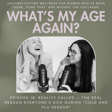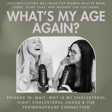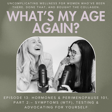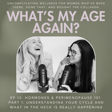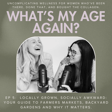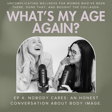Become a Creator today!Start creating today - Share your story with the world!
Start for free
00:00:00
00:00:01

Ep 8: Food Boundaries - It’s A Practice (AKA Saying No to Aunt Gina’s Lasagna)
This week is one of our favorite conversations to date. We are diving into the topic of food boundaries and just how difficult social gatherings can be when you are trying to be consistent with your dietary and lifestyle choices.
In this honest episode, we dig into:
- Why food is so emotionally tied to gatherings, celebrations, and showing our love
- How being a “good host” can sometimes work against your own boundaries
- The emotional and physical toll of people pleasing
- Strategies to stick to your boundaries without making things awkward
- How to communicate your needs in a loving way—even when it feels uncomfortable
Where to find us:
Or email us at: wmaapod@gmail.com
Where to find Tanya:
IG @tlcholistic
FB @tlcholistic
Book with Tanya: https://tlcholistic.janeapp.com/locations/tlc-holistic
Join the TLC Community: https://www.patreon.com/tlcholistic
Where to find Kim:
Book with Kim: Complimentary Connect Call
Transcript
Introduction to the Podcast
00:00:00
Speaker
Welcome to What's My Age Again, the realest podcast for women who are done chasing trends and ready to feel empowered. Hi, I'm Kim. And I'm Tanya, holistic nutritionists and childhood best friends who've been there, done that, and bought the collagen.
00:00:16
Speaker
more than once.
Mission and Goals
00:00:17
Speaker
Each week we provide actionable steps that you can start today to help you thrive through every decade to come. We're cutting through the wellness noise to bring you honest conversations about aging, hormones, health, beauty, mindset, and everything in between.
00:00:33
Speaker
You see, we're also on a mission to age gracefully one WTF moment at a time. Backed by research
Story on Food Boundaries
00:00:40
Speaker
and real life, we're here to share what actually works, what's a waste of time, and how to truly thrive through the messy, magical midlife transition.
00:00:49
Speaker
We're so happy you're here. Let's dive in. Hey, everybody. Welcome back to What's My Age again. How are you, Kim? Hi, Tanya. I'm good. How are you?
00:01:00
Speaker
I am good. So I have to tell you this story now because it's fresh in my mind. Okay. um And there'll be a purpose to this story. So I was talking to one of my girlfriends earlier in the week and um she was talking about how she had just had some friends over to her house and how she felt like utter crap for the next two days. And I was like, okay, hold why? Like,
00:01:26
Speaker
what is, you know, what happened? And, um, she said, well, the usual, and I was like, what's the usual? She's like, you know, you have people over, you entertain people. So you bring in food or you make food that is not usually part of what you eat. And you might drink things that is not usually part of what you drink.
00:01:49
Speaker
Um, But you have that food available because that's the food, you know, that you feel or we feel like, you know, your company will like and that's what they eat and you entertain them and they're you're coming they're coming to your home.
00:02:02
Speaker
So then
Episode on Food Boundaries
00:02:03
Speaker
you eat that food. And as you're eating it, she said, she's like, Tanya, I know I'm going to feel like garbage tomorrow. And I couldn't stop.
00:02:12
Speaker
She said, and it was so good. And I ate and I ate. And she's like, yeah. And she's like, in the last two days, we're right off. And all of a sudden in my head, I was like, this is something that all of us probably right now are like, nodding, ah you know, that this has happened to us before or something similar.
00:02:35
Speaker
And then me and you were talking a while back that we wanted to do a show on food, boundaries, boundaries surrounding food. So like, if this isn't a prime example, I think this is the day for the show.
00:02:47
Speaker
um so And summer is a perfect time for that. You know, Tanya, your client is like so many clients that I've talked to and actually myself at the beginning of when I changed my diet and lifestyle.
00:03:01
Speaker
um You know, so many stories like this where we are, yes, maybe entertaining guests, but maybe we're going out to somebody else's home this summer, having summer barbecues.
00:03:14
Speaker
going on vacation with groups of people that we'll be eating and celebrating and drinking and hanging out with all week. And
Challenges of Maintaining Boundaries
00:03:23
Speaker
yeah, and having this sort of diet and lifestyle that we are accustomed to and then changing it for others.
00:03:32
Speaker
Oh my gosh, a thousand percent. And exactly like you said, it applies to so many situations. And I feel like this resonated so hard with me for so many reasons.
00:03:42
Speaker
But one main reason is obviously since I've moved to a different province, I have more people that come to my house. And stay at my house, which wouldn't have happened, you know, when you live down the street. It's not like you were coming over and spending a week with me, you know, when you're you're in the same town.
00:03:58
Speaker
And I'm then going back to Ontario and spending significant amounts of time, you know, at my mom's or at friend's house. homes. And I realized exactly, even within myself, these boundaries sometimes become porous and they become difficult and they become uncomfortable and they become awkward.
00:04:17
Speaker
So I think it's something we need to dissect why this is the case and what are some things that we can do to make our boundaries less porous without feeling like you want to crawl under a rock and that you just have to kind of succumb to what everybody is eating and drinking and then and putting yourself last, right? And making yourself feel literally like a bag of crap.
00:04:36
Speaker
Well, and we just had the podcast. And for those of you who haven't listened, you can go back and listen where we talk about vacation and we talk about how to feel good after vacation. And let's face it, we're in the summer.
00:04:48
Speaker
If you're listening to this podcast today, you know, in real time as we launch it, we're summer holidays. We're going to be going into the crazy busy season of September, October, November, then holiday.
00:05:01
Speaker
We don't want to feel depleted as we move into September. And this is the time
Healing Process Analogy
00:05:06
Speaker
where we can sort of regenerate, get energy from the sun, and we don't want to feel terrible at the end of our summer. So I think this is the perfect conversation for today, Tanya.
00:05:17
Speaker
Absolutely. So do I. And I also want to refer back to, to app for the seasons, for sure, especially going into such a busy time. And then me and you have talked a lot about, you know, on prior podcasts, and i I talk about it all the time with my clients on my social media. And I'm sure you do too, Kim is, I always tell my clients that you can get on and off the proverbial train anytime you want. And that is the train of healing, pulling into your goal station at the end.
00:05:48
Speaker
Okay, because that's going to happen and healing isn't linear. But the more times we get off the train, the longer it's going to delay us getting to the destination And a lot of the times when we get back on the train, for some reason, it's a lot harder.
00:06:08
Speaker
We don't have a good seat anymore. We might have collected some more baggage. So it feels even harder. So that's really applicable to me. I'm someone who in my healing journey, and I'm still on it, um can get on and off the train. And I'm very open with that.
00:06:24
Speaker
But especially as I'm in this magical mid-lifetime of my life, every time I get off the train, Kim, Why is it so much harder for me to get back on? Like I stopped working out, let's say for a week doing my strength training and I, I, I'm like, what is going on? Like, so it becomes even more important.
00:06:44
Speaker
I feel as we age to tighten those boundaries because it's even harder when we get off the gosh darn train. Okay, two
Value of Setbacks
00:06:52
Speaker
things, Tanya. Oh, so many things. i First of all, I love your analogies.
00:06:55
Speaker
I'm loving the train analogy here. I use the bank now like in my practice, and now I'm going to take the train on for myself too. okay but Okay, so a couple of things here. Number one, I love that you said that healing is not linear because for so many of us, we think, you know even if you think about the medical system, you take a pill, symptom goes away.
00:07:20
Speaker
But when we're looking at root cause healing, we're looking at really healing from within. we can see It doesn't go straight up like this. We can we go up and then a symptom can come back and then go a little bit further. But we're always heading in the right direction. We're never going to go back to where we started.
00:07:39
Speaker
That's one thing. Number two, when you're talking about getting off the train, what I also like to tell my clients is if you do get off the train for whatever reason, you stop working out for that week, maybe you eat something that's not you know that's not in your normal diet at the time, or whatever it getting off the train means for you, that's information that's coming to you. what the symptoms that your What your body is telling you, maybe you feel sluggish after that week, you don't have any more energy, or
00:08:11
Speaker
You know, you have digestive upset after you eat a certain way. That information is telling you something and it's also motivating you to stay on that train next time.
00:08:23
Speaker
So,
Emotional Attachments to Food
00:08:24
Speaker
you know, as much as you can feel, some people kind of feel as a failure or, you know, they get down on their themselves for it take it as information and use it to motivate you to keep on that train further.
00:08:37
Speaker
I love this. So there's one thing that we know. When we get off the train, we get information in the form of symptoms. And they're always not great because we know we're on the train for a reason.
00:08:50
Speaker
So can we talk about then why the heck do we still keep getting off the train? We know We want to stay on the train.
00:09:00
Speaker
What the heck is happening with our boundaries that we get off the train? And I'm going to let you know, for me, I'm going to give you an example of getting off the train.
00:09:12
Speaker
So my friend got off the train for having people over for a night at dinner. I got off the train in July. i had family come for a week. It was absolutely amazing.
00:09:24
Speaker
Why did I feel the need buy buy certain foods that I normally don't have in the house and have them in the house for when my family came.
00:09:39
Speaker
Why did I feel like having those foods would make the vacation even better? You know, it'd be even better if when we went, did our beach day, we had a huge bag of chips.
00:09:50
Speaker
Do you know what would be even better? if we had a pack of chocolate bars from Costco, I bought that. I'm being, I'm being serious and I'm being vulnerable because if I bought that, if we had that there and then like sitting around the fire at night, we could have like chocolate or whatever.
00:10:06
Speaker
yeah, Why did I buy that knowing that if that's something that they ate and made them happy, that's amazing and they were going to eat it. I bought that knowing that I was going to eat those things too.
00:10:20
Speaker
What made my boundaries so low? And there can be many reasons, which I'd like to get into right now, why that makes us difficult to stay true to our boundaries.
00:10:32
Speaker
And for me, Sorry, for me, that situation came down to my emotional connection to food and how I used to consume it. And which sounds weird, a connection of love with food, which we can go into deeper in a second. Like I want to love them so hard with these cozy comfort foods.
00:10:54
Speaker
And I think about my own mom, Tanya. So when I go back home to Toronto and mom, I'm sure you're listening. And so- Please don't take offense to this. We you, Kathy. We literally love love you, Kathy. Her love language too. She gives to others. And so I will see, she'll know that I'm gluten-free.
00:11:12
Speaker
So she'll buy bars or a gluten-free cookie. And, you know, the the it's the sentiment behind it. She's trying and she's, but, you know, at the same time, I feel guilty for not eating it then.
00:11:28
Speaker
And you know what, Tanya, to be honest, at the beginning of my healing journey as well, so i I've changed my diet and lifestyle for almost a decade. And so I'm getting really good at having food boundaries and sticking to them and not feeling guilty anymore for not eating the score bar or not eating the cookies that just I know is not going to make me feel good.
00:11:51
Speaker
But at the beginning,
Navigating Social Pressure
00:11:53
Speaker
you want a people-please. You want to be the good, you you don't want to insult your mom, your mother-in-law, Thanksgiving dinner, who's just made this beautiful dinner. And you can't have the gravy and the stuffing and the whatever else just because you've chosen that as a food boundary.
00:12:11
Speaker
It's hard at the beginning to be able to stick to those boundaries. And and You know, especially when people are showing you that love, right? Like my mom is doing with the score bars or what you're doing.
00:12:26
Speaker
And yeah. so Yeah. And I'm in that pattern, which is wild. Yes. People pleasing is another huge one. Yeah, people-pleasing, food as a love language.
00:12:36
Speaker
And how about this, going into a little bit about guilt here as well. So here's another example. We talked about when people come to our house, you know ah just as an example of where a boundary can be pushed.
00:12:47
Speaker
How about a boundary of celebrations? So hear me out on this one. um My birthday is one month before Christmas. So I used to be like,
00:12:58
Speaker
Well, I mean, it's already the holiday season, so let me just celebrate my way into Christmas. So what does this mean? It means that we're blessed, you know, to have multiple people that might want to take us out for an occasion or spend time with us, like a birthday, for example.
00:13:15
Speaker
So if I'm one person, me, hi, um and I have five friends who don't all know each other and we all want to celebrate my birthday, you That can mean that you're going to go out five different times, have five different meals out at a restaurant, have five different sweet treats, whether it's a slice of cake or a cupcake.
00:13:36
Speaker
And the the boundary there can be guilt, not wanting to say, you know what, oh, you know... Can we just come, can we not do something around food or whatever? Like you're just like, these people want to celebrate me. So I'm going to indulge in that.
00:13:53
Speaker
But at the end of the day, you are always the one who loses because you're always the one that gets off the train. Right? So here's the thing. Here's the thing with that. I think too is, you know,
00:14:07
Speaker
I, you can go out five times with five different groups of friends of of people, go to a restaurant if you like, but find something that works for your boundaries.
00:14:19
Speaker
And maybe it's also, maybe the boundary is sleep. Maybe you don't want to be home at 1130 at night. So making that one group of friends have a lunch date or having people to your house. But like, I think the answer here or some of the things to think about here is like,
00:14:37
Speaker
Why don't you make those fun celebrations within your boundaries? Finding a restaurant that you love, that may serve food, that you know you're going to love and indulge in, but that works within your food boundaries.
00:14:52
Speaker
Going out at a time that works for you, or maybe, you know, whatever that may be. Or not even having it around food, going out for a hike. Going for a hike.
00:15:03
Speaker
You know what I mean? So I'm with you, Kim. And it's like we ask those questions. Why do we feel the need? And I think that also comes back to guilt and not wanting to...
00:15:13
Speaker
hurt other people's feelings and insult them. But we have to remember they're suggesting a plan that works for them, which is beautiful. That works for their lifestyle. Hey, do you want to go out and have dinner here? And you're like, shoot, I've looked at that menu. I know it's not going to be great for me, but you accept, but you're right.
00:15:32
Speaker
We don't have to, we need to start examining the reasons why we're not comfortable in doing things within our boundaries. Well, and let's be honest too. Like I,
00:15:43
Speaker
When I first changed my diet and lifestyle and here, okay. So prior to me being diagnosed with Hashimoto's and deciding to really change my diet and, um,
00:15:58
Speaker
I, would eat the charcuterie board. would I drank like the alcohol was a big part of my life. she So changing my diet was really different for the people that lived with me, hung out with me.
00:16:14
Speaker
i was, you know, I was completely different. And so I would get the comments of, oh, you're not drinking tonight or, oh, we can't split the pizza or, oh, why do you have to bring your own food? Is my food not good enough?
00:16:28
Speaker
Which is always a good one. Love it. Right. And, it and it you know, you come up against this feeling of like, oh, I don't want to insult or, oh, maybe just one drink.
00:16:41
Speaker
Or like you said, oh, it's just one night. And then your food boundaries slip. And so it is hard. It is hard, a especially when you're getting these comments and feedback from the people that you love and you don't want to disappoint.
00:16:57
Speaker
I love this. This is such a good point. And again, I'm going to be honest, me too, my transition for, um, into a different lifestyle has been probably over, oh my God, why do we have to say these things out loud?
00:17:11
Speaker
Like about 14 years. I'm in my head, I'm like two years. No, no. and How long did we live before that? Oh my goodness. Yeah. So thinking about that, me too, but I'm going to be honest.
00:17:26
Speaker
I was that person before then, Kim. And what you say and the things that I hear now, I'm on on the other side of it and I'm not proud of it. And you know what? It can come down to a lot and it doesn't mean this is the case for everybody.
00:17:38
Speaker
But a lot of the times when we're getting reactions like that, oh, you can't do this, you know, ah you you can't have my potatoes or whatever the case may be and you're bringing your own stuff, I'm um It has a lot to do about their reactions and them, you know, not supporting your choices.
00:17:55
Speaker
Sometimes we'll
Sharing Health Journeys
00:17:56
Speaker
come back to actually reflect what's going on with that person giving you those reactions. And Kim, I used say this. It's more about them than it is about you. Yes. And we have to remember that when we're setting boundaries, whether it's in food or in life, the only thing we can control is how we voice our needs and and how we react in a situation to stay true to us.
00:18:19
Speaker
And I think it's an important reminder to remember that a lot of times the reactions are other people's triggers. And I'm sad to say anybody who I ever did that to, you know, to be like, oh we, but why can't you have one cupcake or whatever? And I can think of specific examples with specific people that was on me.
00:18:37
Speaker
And that was my worry and my trigger. And now I'm on the other side of that. I can see that when other people, You know, when I'm getting those reactions and it kind of helps me with my boundaries because it makes you reflect and understand that it's not about me and by. And I mean, there are some people in my life and maybe for those of you listening, there might be some people in your life where you will be.
00:19:01
Speaker
You want to tell them your story, your health story, you know, why you're making these changes, um why it's important to you. And I did the same thing. i would i There's countless times where I've said, you know, though, i don't want to go back to how I felt before.
00:19:16
Speaker
And I feel great now. And I know how, you know, when you, when especially when you come to someone who has sort of hit their proverbial rock bottom, sounds very dramatic, but felt terrible. Yeah.
00:19:27
Speaker
and
Setting and Practicing Boundaries
00:19:28
Speaker
then through diet and lifestyle have seen the changes and felt the changes come with diet and lifestyle, um you know, that's the motivation itself to not go back to where you were before.
00:19:42
Speaker
And so I express my story. I tell my story openly to people and then hopefully they will accept it. But at the same time, for those of you listening, you don't have to share anything. You can just kindly say,
00:19:56
Speaker
you know what, Aunt Gina, I'm go to i i'm going to bring XYZ to the party. Done. Something that you can eat, right? to my yeah Exactly.
00:20:07
Speaker
You know, or no, thank you. I'm not going to have a glass of wine tonight or whatever you will say. Yeah. And I think doing that too, sorry, and that sounded so rude that I kind of started laughing. I don't know why. I don't know why. Aunt Gina? No, I don't have an Aunt Gina.
00:20:24
Speaker
And I don't know why that made me want to burst out laughing. I'm trying not to look at Kim as she's saying that. But exactly. Very valid things to say to Aunt Gina or whoever you're saying that to. Aunt Gina is a tough one. ah She is set in her ways and she is going to be insulted.
00:20:39
Speaker
But I think it's important to remember that Anytime we set a boundary, it's most likely, for most of us, gonna be awkward, gonna be uncomfortable. We might have that worry, you know, if we're being insulting, but I think it's like practice makes perfect.
00:20:56
Speaker
The more we put that boundary in place, the easier it's gonna become. And Kim, I really- I love that. Practice. It's a practice. It is a practice. And those who know me personally, I know i know they know who they are.
00:21:10
Speaker
I am the queen of boundaries. but I'm still a work in progress with food because I use that going out or people coming as an excuse to sneak in the foods that I know that i don't want to have. So it's a practice and I am the boundary queen in my life, but with food, I'm still practicing.
00:21:28
Speaker
like Well, and you know what, Tanya, I loved your your your conversation about your client at the very beginning to go back to that. That was a good example, similar to what you were just saying is bringing food into your own home. And so me, I'm okay with bringing other people's food. If my dad, my dad recently came to stay here and he has his rice Krispies and milk in the morning. And so I did bring it into the home, my own home and that was his food. He ate it. My family didn't consume it. And that was okay. However, if for example,
00:22:01
Speaker
you know that bringing chips into your house right now is not a good idea. Or, you know, if if it's going to feel bad for you to bring that food into the house and then have to be, you know, it'll be difficult for you to not consume it yourself or that's, you know, that should be your food boundary right there.
00:22:22
Speaker
Everybody's food boundaries will be different. I can bring certain foods into my home for others when they come, if that's what they want. Just like when I go to my mom's She makes sure to have gluten-free food for me. We buy organic when we go there.
00:22:34
Speaker
It's kind of this back and forth. But if that's difficult for you, that should be the boundary. And you're
Personal Responsibility for Boundaries
00:22:42
Speaker
so right. So I can do the same thing, and I do.
00:22:45
Speaker
There are dozens of items I can bring into my home, and I do from one when my mom comes, my in-laws. Even i brought stuff in for my family that was no problem for me. But you tell me that I bring in chips,
00:23:00
Speaker
chocolate or cheese, I utterly screwed. so you're right. Those are three things. And I am going to make those a food boundary and have that as part of my practice. um Because it's so important and trying to do the same. You know, when I go to my mom's, my mom is awesome as well. I she buys so many things that she knows I have. She, has such a good memory. She remembers brands she sees here and she has them in the house.
00:23:31
Speaker
But then also she's like, ah I got a brick of Balderson. cheese And my mom is literally so cute being like, did you want some old cheddar? And I'm like, yeah, but I don't, but I do, but I don't. So i have to learn too. That's what I was going to say earlier. And I got off track.
00:23:48
Speaker
ah Who knows? I really admire you, Kim. Um, putting it out there about giving your why and ah and the respect to people that don't want to. And I'm going to do that more.
00:24:00
Speaker
So I'm going to literally remind myself to share that because I have no problem sharing it. And what happens when I eat these foods and literally how it makes me feel.
00:24:11
Speaker
And I don't want to feel that way anymore. So even with my mom, who I know is going to listen and mom will have this conversation after, like, Yeah, I don't want to eat the cheese. So can we maybe not have it there? And the chips and, you know, and just like Kathy Newton, Nicole Church and Kathy Newton are little peas in a pod. They're so cute. They're also, they were besties and they still keep in contact, but their love language, their caring is that cozy food, right? nurturing It's up to me to speak my boundaries lovingly to whoever it may be.
00:24:44
Speaker
It's my boundaries and nobody's responsible for them except me. A hundred percent. And, and yeah, like it's, I think what we also have to think about is it's hard to make these dietary and lifestyle changes in general.
00:25:01
Speaker
So for all of you out there who are, who are making these changes for yourself, for the betterment of your health, that is amazing. Good for you. And it is hard to stick to them in general, let alone when we have other people's voices in our heads or the guilt or the, you know, celebrations where we feel, oh, I have to do this.
00:25:22
Speaker
That is like even harder. So as Tanya said, which absolutely loved, it's a practice. It's a practice. Start off Start off with the next, you know, gathering that you go to, having those boundaries, and it'll get easier and easier and easier. And the conversations will have be easier. And even the no will be easier.
00:25:43
Speaker
No, I won't have that. will come out a lot
Planning for Social Events
00:25:45
Speaker
easier as you practice. It's true. At the beginning, it is really hard. And even the most tough critics, like maybe Aunt Gina, will eventually get that message that it's a no and it'll just become ah no one, right? and Oh my gosh, Tanya.
00:26:03
Speaker
ah Sorry to cut you off because I know we're like we're we're wrapping up this podcast and we could go off in so many directions. But one little thing that I loved, just because it's been 10 years or almost 10 years now, is That Aunt Gina, I'm just going to use her as an example. Well, now it's always going to be Aunt for all the examples.
00:26:20
Speaker
Oh, totally. They'll be like, hey, you look like, you look, you look better. You look like the, all but all of a sudden these comments, what are you doing? Or, you know, whatever, all these.
00:26:31
Speaker
And then Aunt Gina is listening in the wings and sort of seeing your transition as well. And, you know, Exactly what you said at the beginning. You never know who you're coming up against and how they're feeling about their own health and what's going on in their life.
00:26:47
Speaker
So sometimes that resistance or those comments are coming from that place. You're absolutely right. And from someone who's been in both of those places, that resonates so hard. I don't know if I was as tough as an Aunt Gina, but definitely have been in that position. So let's wrap her up.
00:27:04
Speaker
Let's talk about the takeaways real fast before we go. Number one for me is that we are always in control of our boundaries. We get it's hard, but we are in control of our boundaries. And maybe after this podcast, make a quick list.
00:27:20
Speaker
of all the times where you know that your food boundaries are crossed or that will be crossed. And then just kind of reflect on that and pre-plan in the future, knowing, okay, when I go here with so-and-so, I always break my food boundary.
00:27:34
Speaker
And knowing beforehand, you know, maybe how you're going to make it less porous, that can help moving forward as well. So that's one thing that we can take away from that. Practice and plan. Yep. Defining what are your food boundaries. Like for Tanya, maybe it's the bringing food and certain foods into the house.
00:27:50
Speaker
For me, maybe it's the going out and feel me the people pleaser and the one who doesn't want to hurt anyone's feelings. It's practicing that. And I think what you said, Tanya, too, it's having that plan, making sure that when you go to that family gathering or the barbecue this summer, there is something that you're going to eat there.
00:28:09
Speaker
Bring bring a meal that you can eat And just interrupt on that, make it that it's a side that other people can eat. So as a plant-based eater, what I bring as my main, I'm also like, here's a side for this. So it's not like, not going eat your food.
00:28:26
Speaker
I'm only eating this. Bring a main for you that could be a side for everybody else to share that they might love. Absolutely. Right? Absolutely. But planning ahead is, we' ah and it will make you feel better. It'll make it easier because you won't be coming against something where, oh, I can't eat anything at this party.
00:28:43
Speaker
Exactly. And
Empowerment and Engagement
00:28:44
Speaker
remember too, with making plans, whether you're celebrating something, going out with your girls, whatever, with people that you love, the things that they suggest, we don't have to see them as set in stone. Those are days and times and places that work for them. You feel free then to say, I would love to see you, Kim.
00:29:00
Speaker
um These though, actually for me, are the days and times that that work for me and give a whole bunch if the other ones don't work for you. And could these be some of the places because it's a lot easier for me to X, Y, Z, or take it away from food entirely. And it's met with love. Your people love you and they want to understand you. And we always feel that we have to go with the plan, what's there, what they're eating, what they're planned.
00:29:23
Speaker
We don't. Let's work together with the people we love to make it work for everybody's boundaries. Yeah. And at the end of the day, this is your health journey. These are your boundaries and you get to say what you will eat, what you will not eat, and you don't have to feel guilty about it.
00:29:40
Speaker
Absolutely not. And then flipping the coin too, just to end this episode, if someone one speaks their boundaries to you, you don't take it a certain kind of way. You know, I'm assuming I don't.
00:29:50
Speaker
So why, when you speak your boundaries to someone else, does that voice in her head automatically assume you are being rude and ignorant by saying that? You know what I mean? It's not how we're coming across.
00:30:01
Speaker
It's just keeping our boundaries. All right, everybody. We hope you have a wonderful rest of your summer. No more people pleasing. Keep all those boundaries. Aunt Gina's going to get it eventually. Aunt Gina will come around.
00:30:16
Speaker
Until next week, we will talk to you soon. Bye, everyone. Thanks for listening. Bye, Tanya. Bye, guys. Hey, guys. Thanks so much for hanging out with us today. If this episode resonated with you, we would love it if you would hit like, subscribe to the podcast, and share it with a friend.
00:30:33
Speaker
We love to hear from you because let's be honest, this show is for you. If you have a topic you'd love us to tackle or want to learn more about something we talked about today, send us a message. We got you.
00:30:46
Speaker
Stay connected with us on social media at what's my age again dot podcast for even more knowledge and inspiration between episodes. Kim and I aren't doctors or your healthcare care practitioners.
00:30:59
Speaker
Everyone's body is unique, so always consult your own healthcare care provider before starting something new.





